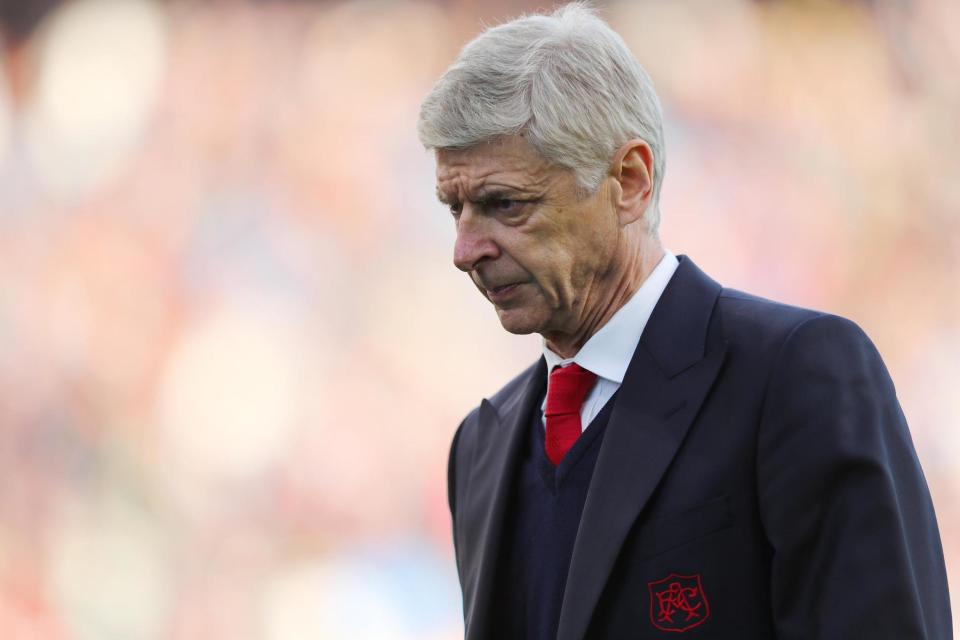Chelsea quash Arsenal case for stability with 15 trophies under 11 bosses during Arsene Wenger's title wait

Arsenal versus Chelsea. Stability versus instability. Look how that one has ended up, more than 20 years after Arsene Wenger took charge of the Gunners.
The widely accepted wisdom in football is that too much upheaval is a bad thing and that longevity in a managerial reign is the ideal scenario for success.
In England, that point was hammered home at the very top by the lavishly successful 26-year rule of Manchester United by Sir Alex Ferguson.
Yet in the 13 years since Arsenal last won the Premier League, Chelsea have had 11 different men in charge of the team, Jose Mourinho and Guus Hiddink twice. And in that time they have won the Champions League, four titles, the Europa League, four FA Cups, four League Cups and a UEFA Super Cup – with another title now being reeled in.
What this tells us is that Wenger, with the end of his historic command of Arsenal in sight, seems finally to be admitting defeat in the battle which has aggravated him most in the 14 years since Roman Abramovich arrived at Stamford Bridge and shifted the game here irrevocably.
He has finally been overwhelmed by the forces of immeasurable wealth and might which placed Chelsea and Manchester City at the top of the English game – by the power of what Wenger memorably called “financial doping.”
It is the vast scale of the resources which have been at Chelsea’s disposal which has made the old belief in stability irrelevant in their prominent case.
That is not to knock them, by the way. It is just a statement of the facts about modern, top level football.
Abramovich even secured himself two European trophies with men in charge who were basically just minding the shop, Roberto Di Matteo and Rafael Benitez.
It all looks very promising for their current boss, Antonio Conte, just now as he heads towards a championship victory in his first season here. The aim is for his tenure to be a long one and for Chelsea to put behind them their old trigger-happy but highly successful ways.
But let’s face it, if things went wrong next season, if the return of Champions League football complicated matters enough – it shouldn’t do, of course - then Abramovich would hardly be entering risky, uncharted waters if he changed mangers yet again.
The huge irony is that it is Arsenal who will be setting out on to such choppy, unfamiliar seas once Wenger departs after so long at the helm.
Okay, let’s be honest here, Arsenal have hardly been paupers under Wenger. Everyone has done very nicely there, financially, particularly since Stan Kroenke became the most powerful force in the boardroom, with his penchant for running his many sports teams more successfully on the balance sheet than on the field.
Wenger, reluctantly it must be said, has joined in the transfer arms race in recent times, too, to land players like Alexis Sanchez and Mezut Ozil.
Some estimates suggest Wenger has earned around £100 million since 2004.
Yes, he clearly felt it was against the spirit of the game when Chelsea and City cranked up the financial stakes on such a massive scale. He has fought all along to maintain his principles on and off the field. But he has done very well for himself out of annual qualification for the Champions League, too.
Again, its not a criticism. People at the top of the game are well paid because they are the front of house men for a huge, global entertainment and corporate marketing business. These are just plain market forces at work.
But it is those same market forces which usurped Wenger just when he had the English game at his feet in the wake of his third title triumph with the magnificent Invincibles of 2003-04.
All along, I’ve sensed that a major, gnawing part of his mission has been to prove that success can be achieved in football by econonoimic self-sufficency of Arsenal’s kind – and Manchester United’s – against the kind of injected wealth which transformed Chelsea and City.
But now it seems clear that it can’t be achieved on any long-term scale, the troubles of Leicester City in the wake of their astonishing Premier League victory underlining that point right now.
The fight to prove his belief – and to do it by playing a particular brand of attacking football – has left Wenger’s teams without any steel in recent times.
He seemed to have his moment approaching again in the wake of the second successive FA Cup triumph in 2015 and following the arrival of goalkeeper Petr Cech, who was thought to be the last piece required in the team’s jigsaw.
It wasn’t the case, however. Many fans even saw last season’s second-place finish a touch illusory.
Of course, it will be a huge wrench for Wenger if he does leave the Emirates at the end of the season.
But he has already intimated that he will manage elsewhere if he departs rather than hang around as an eminence grise above any new boss.
It is right that he has made that much clear already. It would be a mistake to stay on upstairs.
The problem for Kroenke in replacing him may be uniquely thorny, however, if the fans suspicions are correct and that he just wishes the club to tick over and reap the rewards.
How do you square such a requirement with the arrival of any new boss, who would seek the job full of ambition and desire to win?
Naturally, the game’s big names would queue up to manage Arsenal.
Would any of them be content just to be a specialist in reaching the last 16 of the Champions League, though?

 Yahoo Sport
Yahoo Sport 





































